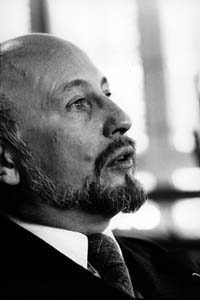Vladimir Volkoff facts for kids
Vladimir Volkoff (born November 7, 1932, in Paris; died September 14, 2005, in Bourdeilles, Dordogne) was a French writer. He had Russian family roots. He wrote books for adults and exciting spy novels for young readers. For his books for young readers, he used the pen name Lieutenant X. His stories often explored themes like the Cold War, secret intelligence, and how people can be manipulated. They also included ideas about deeper spiritual meanings.
Contents
Biography
Vladimir Volkoff's family came from Russia. On his father's side, they even had Tatar roots. His father was a Russian who moved to France and worked washing cars. Vladimir grew up hearing stories about his family's homeland, Russia, which they had left behind. He also felt loyal to France, his new home. He was a great-grandnephew of the famous composer Pyotr Ilyich Tchaikovsky.
Volkoff studied at the Sorbonne in Paris and at the university of Liège. From 1955 to 1957, he taught English in Amiens. He then served as an intelligence officer in the French army during the Algerian War. This experience taught him that wars are fought not just on battlefields, but also in secret and in embassies.
Life in America
After leaving the army, Volkoff went to the United States. There, he taught French and Russian literature. He also worked as a translator from 1963 to 1965. From 1966 to 1977, he was a professor of French and Russian. He was very interested in America, a powerful country with many different sides. He stayed there for almost 30 years, returning to France in 1992. Some of his books from this time include L'Agent triple (1962) and Métro pour l'enfer (1963).
During the 1970s, Volkoff wrote stories for teenagers. He used the name Lieutenant X for these books. They were part of the Langelot series published by Hachette's Bibliothèque verte. These books followed the adventures of a young French secret agent. In these stories, Volkoff showed his love for exciting plots and unexpected twists. He also showed his deep understanding of how world powers balanced each other.
In the late 1970s, the Cold War between East and West was still happening. Volkoff's writings looked at the battle of ideas between two different ways of seeing the world and freedom. His stories had a strong background in world politics.
Volkoff was also a keen competitive fencer. He was an important member of the fencing community in Georgia, USA. He said he started learning to fence while serving in the Foreign Legion. His book "The Traitor" was published in 1973 while he was in Atlanta. He used another pen name for this book: Lavr Divomlikoff.
Back in Europe
In 1979, Volkoff's novel Le retournement (The Turnaround) became very famous around the world. It was translated into many languages. The book was dedicated to Graham Greene, a writer Volkoff admired. The title "The Turnaround" refers to a spy trick. It's when a secret agent from one side is convinced to work for the other side. The book tells a spy story involving American, French, and Soviet intelligence services. It also tells a story of a spiritual change for the main character.
In 1980, Volkoff published Les humeurs de la mer. This was a large story told in four books. With Le montage ("The Set Up"), published in 1982, Volkoff showed how the Soviet Union used "disinformation" in Europe. Disinformation means spreading false information to trick people. This book won the Grand Prix du roman de l'Académie française.
In 1985, he wrote Le professeur d'histoire (The History Teacher). This book was inspired by his time in America. It showed a funny clash between an old-fashioned writer and a young, modern heiress.
Many of his books focused on power, manipulation, and battles of influence. These include L'Interrogatoire (1988) and Les Hommes du Tsar (1989). The latter was a historical novel about Russia.
In the 1990s, Volkoff published Le Bouclage (1990), a novel about safety in big cities. He also wrote La Trinité du Mal (The Trinity of Evil) (1991). This book looked at the bad actions of leaders like Lenin, Trotsky, and Stalin.
When the Berlin Wall fell, it meant that disinformation campaigns were not just from communist countries anymore. Volkoff helped make the word "désinformation" (disinformation) well-known in French. He wrote several books about it, including La Désinformation Arme de guerre (2004) and Petite histoire de la désinformation (1999).
In the 2000s, he returned to his Slavic roots. He published several books about Russian history and its religion. He also publicly supported the policies of Vladimir Putin.
Volkoff also wrote historical biographies, like Vladimir and Tchaikovsky. He also wrote plays for the theatre. In 1995, he received the Grand Prix Jean Giono for his writing. In the same year, he was made a Chevalier de la Légion d'honneur, a high honor in France.
Family
Vladimir Volkoff was survived by his second wife, Carla Denise Volkoff. He also had one child, Tatiana Gfoeller-Volkoff, from his first marriage.
See also
In Spanish: Vladimir Volkoff para niños


